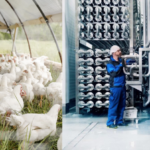Securing food and getting youth into work dominates the top four opportunities in this year´s Global Opportunity Report.
Today, on the 26th of January, is the launch of the Global Opportunity Report 2016, which aims to inspire and encourage leaders to grasp the kinds of business opportunities that can help eliminate the world’s biggest risks. This year, risks such as ‘loss of ocean biodiversity’, ‘accelerating transport emissions’, ‘resistance to life-saving medicine’, ‘youth unemployment’ and ‘global food crisis’ were transformed into 15 opportunities.
According to the report, businesses are perceived to be among the top advocates for all 15 opportunities. Only civil society ranks higher. However, since both businesses and civil society are expected to advocate strongest for the same opportunities, new forms of solution alliances are predicted to emerge between business and civil society for collaborative actions to change societies from the bottom up.
It´s all about technology
The survey has tested the capacity to pursue all 15 opportunities across three dimensions – technology, economy, and political will power. Of these three dimensions, technological capacity is consistently perceived to be the lowest barrier to change. Thus, in four out of the top five opportunities, technology will play a significant role in enabling private and public leaders to act in an effective manner.
The top opportunity for this year is more sustainable and efficient production of food, using technology and digital solutions. Business believes that the world is willing and able to change how we produce food by making farming smarter. Civil society is also expected to fight hardest for changes to the current food system, including food waste reduction, smart farming and antibiotic-free food.
Social business highest rated
One of the main topics during the World Economic Forum (WEF) meeting in Davos last week, was the technological revolution´s effect on global labour markets. According to WEF, it is estimated that as much as 7.1 million jobs could be lost through redundancy, automation or disintermediation worldwide, with the greatest losses in white-collar office and administrative roles. A cause of concern is thus the rise of people not obtaining the skills needed in the new economy, especially among the youth, thereby leading to increasing inequality between low-skilled and high-skilled people.
Paradoxally however, of the 17 Sustainable Development Goals (SDG) set by the UN to end poverty, protect the planet, and ensure prosperity for all, number eight, on decent work and economic growth, is the highest rated in terms of business potential, followed by SDG number three on good health and well-being. These are also the SDGs that are perceived to hold the greatest potential to direct societies onto a sustainable development track. In other words, what is good for business is also good for society.










[…] uke og det hele ble etter min mening toppet av tirsdagens DNV GL ’s imponerende lansering av Global opportunity Report og Aftenpostens konferanse om fremtidens arbeidsliv med blant annet Canadiske Don Tapscott på […]